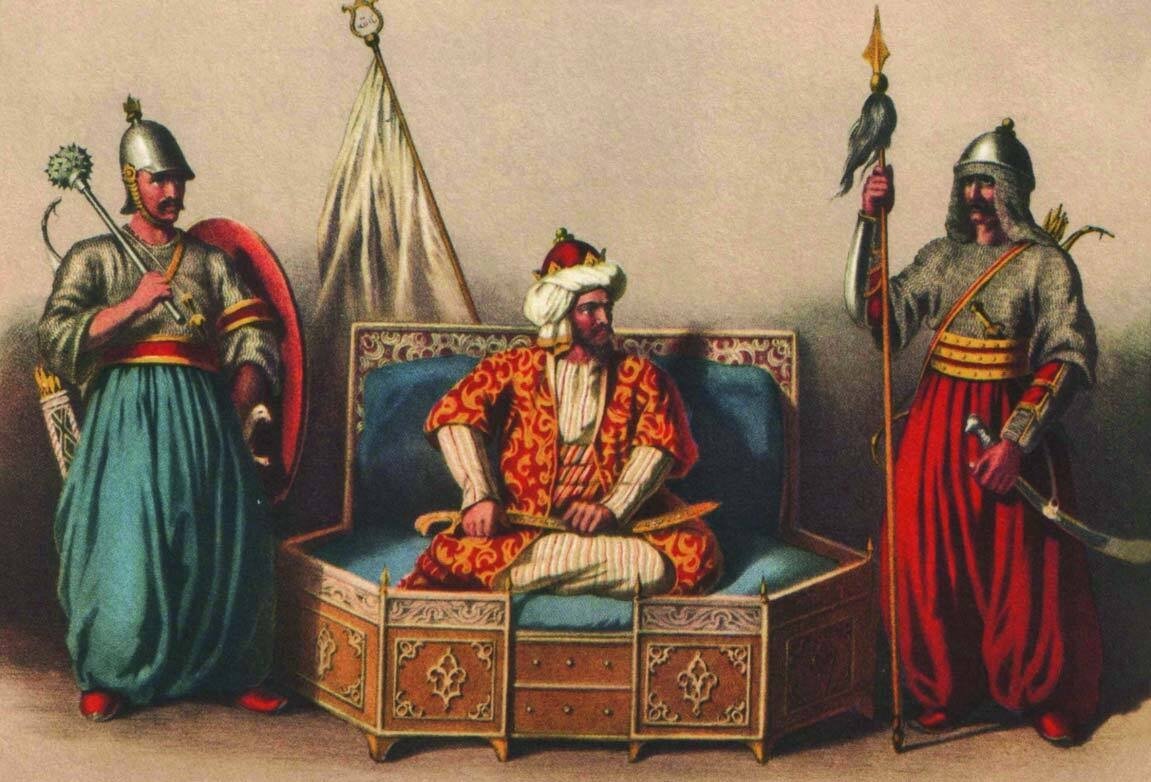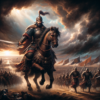Imagine a world where empires are built on the strength of tribes, where the legacy of a people extends far beyond lifetimes to shape nations. This is the story of Osman Ghazi, founder of the Ottoman Empire, and his roots in the Oghuz Turks. For history buffs, Turkish culture enthusiasts, and students alike, understanding this ancestry offers a captivating glimpse into the forces that shaped a mighty empire.
In this exploration, we’ll trace the lineage of Osman Ghazi back to the Oghuz Turks, uncover the cultural and religious influences that guided them, and reveal how these ancient roots left a lasting imprint on the Ottoman Empire and beyond.
Overview of Osman Ghazi as the Founder of the Ottoman Empire
Osman Ghazi stands as a towering figure in Turkish history, known for founding what would become one of the most powerful empires in the world—the Ottoman Empire. His leadership and vision transformed a small frontier principality into a burgeoning state that spanned three continents at its height. Yet, to truly comprehend Osman’s success, we must explore his roots in the Oghuz Turks.
Osman’s strategic brilliance was not born in isolation. It was deeply intertwined with his ancestry and the values imparted by the Oghuz Turks. His ability to unite disparate groups under a single banner and his skill in leveraging both diplomacy and military might were heavily influenced by his heritage.
Understanding Osman Ghazi’s ancestry is crucial for appreciating the foundation upon which the Ottoman Empire was built. It provides insight into the cultural and historical milieu that shaped his leadership style and the empire’s enduring legacy.
Introduction to the Oghuz Turks and Their Historical Significance
Before Osman Ghazi forged an empire, there existed the Oghuz Turks, a nomadic group from Central Asia with a rich history and profound influence on Turkic culture. The Oghuz Turks are more than just historical footnotes; they are the linchpin in the story of the Turkish people and their subsequent dynasties.
The Oghuz Turks were instrumental in spreading Turkic culture across vast regions. Their migrations and conquests left indelible marks on the political and cultural landscapes of Central Asia and the Middle East. They were central to the development of numerous Turkic states and eventually the Ottoman Empire.
The historical significance of the Oghuz Turks lies in their adaptability and resilience. Despite the challenges of nomadic life, they maintained a strong identity and cultural coherence, which allowed them to exert influence over settled societies and contribute to the cultural richness of the regions they inhabited.
The Oghuz Turks Origins and Early History
The origins of the Oghuz Turks can be traced back to the steppes of Central Asia. They were part of a larger Turkic group that migrated westward over centuries, driven by the search for new pastures and opportunities. These migrations were not random; they were strategic movements that helped the Oghuz Turks establish themselves in key regions.
Throughout their early history, the Oghuz Turks played a crucial role in the spread of Turkic culture and ideas. Their interactions with other cultures facilitated an exchange of knowledge and traditions, enriching both the Oghuz and the societies they encountered. They were not just warriors; they were carriers of a vibrant cultural heritage.
The migration from Central Asia to the Middle East marked a significant turning point in the history of the Oghuz Turks. It set the stage for their integration into the Islamic world and laid the groundwork for their descendants, such as Osman Ghazi, to rise to prominence.
The Role of the Oghuz Turks in the Spread of Turkic Culture and Influence
The Oghuz Turks were at the forefront of spreading Turkic culture across a wide geographic area, from Central Asia to Anatolia. Their migrations brought them into contact with various peoples, allowing them to disseminate Turkic language, customs, and beliefs.
Through trade, conquest, and diplomacy, the Oghuz Turks extended their influence. They established powerful states and integrated with local populations, effectively promoting Turkic cultural and political ideals. Their impact was so profound that Turkic languages and traditions became dominant in several regions.
The influence of the Oghuz Turks is evident in many aspects of modern Turkic cultures. They helped shape the societal structures, legal systems, and artistic expressions that persist today. Their legacy continues to inspire pride and identity among Turkic peoples around the world.
The Kayi Tribe: Osman Ghazi’s Ancestral Lineage
Osman Ghazi’s lineage can be traced directly to the Kayi tribe, one of the most prominent tribes among the Oghuz Turks. The Kayi tribe was renowned for its strength and valor, and it played a pivotal role in the political and military landscape of its time.
The Kayi tribe, with its rich tradition of leadership, was a crucial factor in Osman’s rise. The tribe’s reputation for bravery and strategic prowess laid the foundation for Osman’s future conquests and alliances. It provided a sense of identity and continuity that was vital in the chaotic frontier lands of Anatolia.
Ertugrul Ghazi, Osman’s father, was a key figure in establishing the Kayi tribe’s dominance. His leadership and vision greatly influenced Osman, setting the stage for the latter’s accomplishments. Ertugrul’s legacy was one of unity and resilience, characteristics that Osman carried forward in his endeavors.
Importance of the Kayi Tribe in the Political and Military Landscape of the Time
During the turbulent times of the 13th century, the Kayi tribe emerged as a formidable force in Anatolia. Their strategic position and martial prowess allowed them to exert significant influence in the region, often serving as arbiters in conflicts and allies to more powerful entities.
The Kayi tribe’s importance extended beyond mere military might. They were adept at forging alliances and navigating the complex politics of the era. Their ability to balance diplomacy with force made them indispensable players in the power dynamics of the time.
Their legacy is evident in the way they paved the path for the Ottoman Empire. By ensuring stability and cultivating relationships with neighboring tribes and states, the Kayi tribe created an environment in which Osman’s leadership could thrive, ultimately leading to the birth of an empire.
Ertugrul Ghazi’s Leadership and His Influence on Osman Ghazi
Ertugrul Ghazi, the father of Osman Ghazi, was an exceptional leader whose influence on Osman was profound. He was not only a warrior but also a visionary who understood the importance of unity and strategy in the face of adversity.
Ertugrul’s leadership was characterized by his ability to inspire loyalty and his commitment to justice and fairness. These values were deeply ingrained in Osman, shaping his approach to governance and leadership. Ertugrul’s legacy was one of strength tempered with wisdom, a balance that Osman mastered.
Osman’s respect for his father’s teachings is evident in his actions and policies. He carried forward Ertugrul’s vision of a united and strong community, using it as the foundation upon which he built the Ottoman Empire. The lessons imparted by Ertugrul were instrumental in Osman’s success.
Cultural and Religious Identity of the Oghuz Turks
The cultural and religious identity of the Oghuz Turks was a unique blend of nomadic traditions and Islamic values. This fusion created a distinct ethos that influenced their social structures, governance, and worldview.
Nomadic traditions played a significant role in shaping the Oghuz Turks’ identity. Their lifestyle fostered a sense of resilience, adaptability, and communal living, which became integral to their way of life. These traditions complemented the Islamic values they adopted, creating a harmonious coexistence.
Islamic values, particularly Sufism, had a profound spiritual impact on the Oghuz Turks. Sufism’s emphasis on mysticism and personal connection with the divine resonated deeply with their existing beliefs. It influenced their leadership style, encouraging a more compassionate and inclusive approach.
The Influence of Nomadic Traditions and Islamic Values on the Oghuz Turks
Nomadic traditions were the bedrock of the Oghuz Turks’ identity. Their migratory lifestyle instilled a sense of freedom and independence, fostering a culture that valued mobility and adaptability. These traits were crucial as they navigated the challenges of their expansive migrations.
Islamic values offered a framework for social and ethical conduct, complementing their nomadic ethos. The adoption of Islam provided a unifying force that transcended tribal divisions, fostering a sense of community and shared purpose.
The interplay between nomadic traditions and Islamic values created a rich cultural tapestry. This synthesis was pivotal in shaping the Oghuz Turks’ identity and their ability to adapt to changing circumstances while maintaining their core beliefs.
Conclusion
The story of Osman Ghazi and the Oghuz Turks is a testament to the enduring power of ancestry, culture, and identity. By exploring the roots of Osman Ghazi, we gain invaluable insights into the forces that shaped the Ottoman Empire and its profound legacy. The lessons learned from the Oghuz Turks and the Kayi tribe resonate even today, serving as a reminder of the intricate connections between history, culture, and identity.
External Links for References
- Osman Ghazi and the Ottoman Empire: A Historical Overview
- The Oghuz Turks: Culture and Heritage
- Link: Oghuz Turks Overview
- Ertugrul Ghazi: The Legacy of Osman Ghazi’s Father








